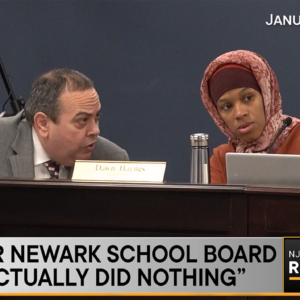
Lakewood’s Cult of Michael Inzelbuch
July 17, 2025
Fixing the Literacy Crisis One Tutoring Session at a Time
July 23, 2025Can NJ Democrats Get To Yes?
Late last week New Jersey Senator Teresa Ruiz, perhaps the most educationally-literate lawmaker in Trenton, told a crowd at the state’s largest Latino business expo that the Democratic Party is committed to “your expectations, your visions, your requests,” and “we have to be more united in that force when education is on the table, and they’re cutting money that we know that that impacts our children the most, because that’s the only place where we can kind of equalize opportunity.” The Democratic Party, she argued, will be the party for all Hispanic Americans.
If Ruiz (as well as gubernatorial candidate Mikie Sherrill whom Ruiz was representing that day) really believe they can speak for the Hispanic population, currently 25% of state residents, they’ll take a serious look at new federal legislation that allows states to opt into school choice programs that grant tax credits for individual taxpayers who donate up to $1,700 annually to “scholarship granting organizations.”
Why? Because these programs are extremely popular among Hispanic parents: polls show that 80% support them. (Among Black parents it’s 78%.) But — here’s the rub— teacher union leaders oppose them. As the Wall Street Journal reports this morning, Party leaders like Ruiz and Sherrill “will face pressure from school associations, including teachers unions, to opt out of the new federal tax credit.”
They’ll have to choose between siding with well-financed bureaucracies or siding with people.
Derrell Bradford, in a new paper for the Harvard Kennedy School, says the increasing public appetite for diverse forms of schools choice like vouchers, ESA’s, charters, and open enrollment programs was instigated by the “bad bet” Democratic party leaders made during the pandemic. With Trump “deeply unpopular” and Biden promising vast sums of money, Dems thought there would be few political sacrifices for school lock-downs that kept students, especially those in districts like Newark and Trenton, out of in-person instruction for the better part of two years. So they allowed themselves to be guided primarily by priorities of teacher unions and “public school bureaucracies” that labeled any attempt at re-opening schools “sexist, racist, and misogynistic.”*
The Democratic Party lost that bet and now there is widespread support for public and private school choice programs among all ethnicities. “While a high price has been paid by all Americans,” writes Bradford, “the Democrats, as a party, sacrificed their command of education as a policy issue… A case could be made that the discontent sown during this moment germinated into the tree of educational pluralism we see growing across the country today.”
If the Democratic Party, both in New Jersey and America, wants to be, as Sen. Ruiz says, “the party for all Hispanic Americans,” it will need to make its own choice between the wonts of stolid bureaucracies and the parents it says it serves.
*That was the Chicago Teachers Union, only slightly more militant that NJEA.





1 Comment
Can they get to yes- probably not. They are in lock step with the NJEA. Although, let’s see if Senator Ruiz and Mikie Sherrill side with and resolve the landmark school segregation lawsuit The Latino Community and the NAACP has against the state of New Jersey. New Jersey ranks the 6 th most segregated school system in the country for Black students and seventh for Hispanic students. Try solving that would be a good first step, otherwise just more lip service.